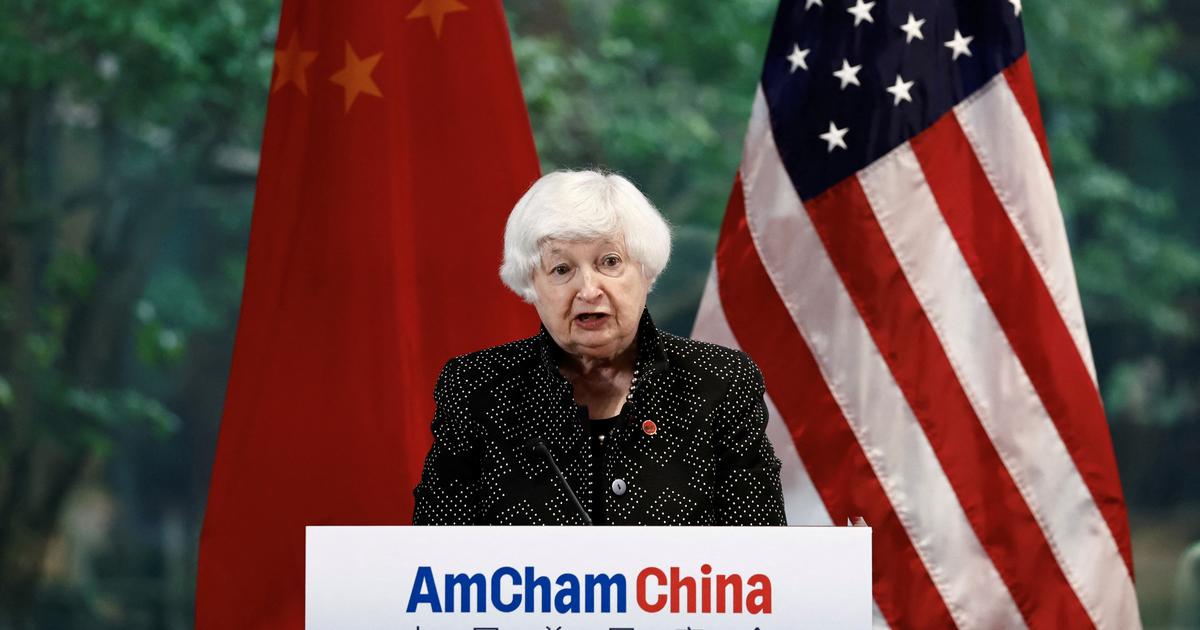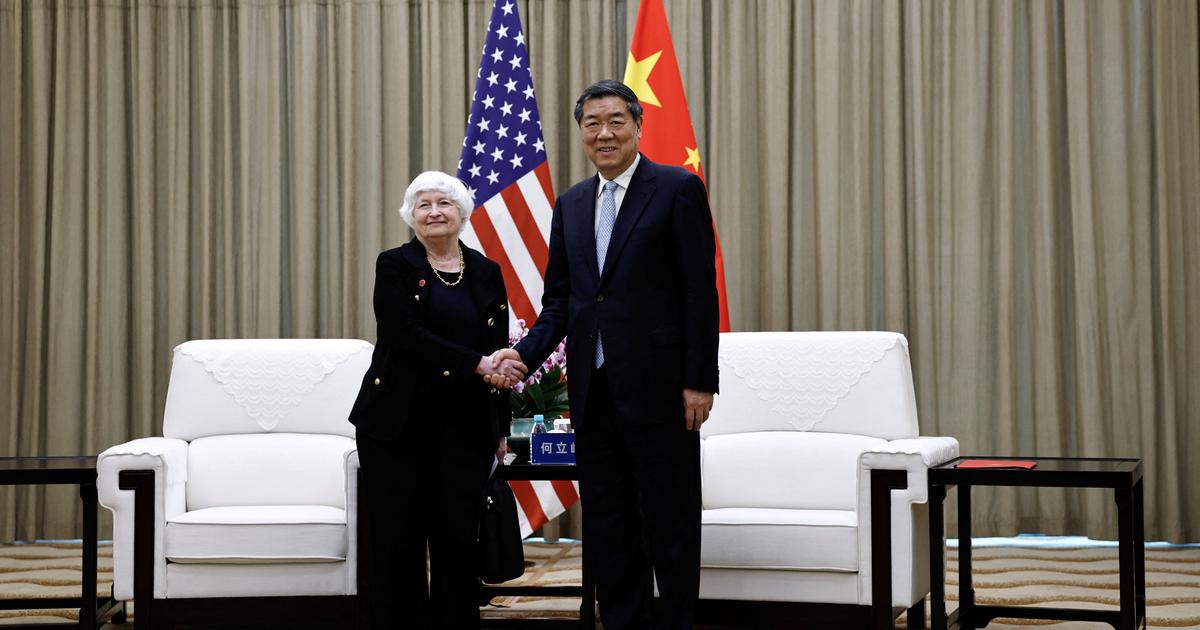The President of Brazil, Luiz Inácio Lula da Silva, upon his arrival in Shanghai. Ricardo Stuckert (DPA / Europa Press)
Brazilian President Luiz Inácio Lula da Silva arrives in China for a crucial state visit that pneumonia forced him to postpone at the last minute last month.
The trip, which includes a stop in Shanghai on the 13th and a meeting with his counterpart Xi Jinping on the 14th in Beijing, is of vital importance for the Latin American power both from a political and economic point of view: China is its first trading partner since 2009 Lula, who is traveling with a huge delegation of businessmen, governors, congressmen and ministers, intends to close some twenty agreements, quite a contrast to his trip to Washington, which lasted less than 24 hours and did not include big announcements.
In the Asian giant, expectations are high.
The state media have been anticipating the visit of "an old friend of the Chinese people" for days, which,
They hope, it will serve to "provide certainty in the midst of growing uncertainties in the international arena."
The Brazilian has already visited China in each of his two previous terms.
Lula intends to reiterate to Xi his defense of a multipolar world order, with a greater role for the large emerging countries, such as Brazil itself, India, Turkey or Indonesia, and for multilateral organizations.
In the hundred days since Lula returned to power, Brazil has sought, from its traditional position of neutrality, to set an independent profile in its international relations: it has refused to send weapons to Ukraine, it has defended dialogue with the regime in Nicaragua and has allowed Iranian ships to dock at its ports.
The Brazilian leader will also present to his Chinese counterpart his proposal that a group of non-aligned countries try to persuade Russia and Ukraine to seek a negotiated solution to the conflict;
He believes that China can play an important role in this third way and maintains that a good part of the planet is far from the positions of NATO and the West and prefers not to join either side.
This vision of a multipolar world is compatible with the one that China tries to promote through its Global Security Initiative (ISG), officially presented last February.
The ISG opposes sanctions (which Brazil does not support either), points out that the great powers must facilitate peace negotiations and mediate "taking into account the needs of the countries involved" and rejects "the confrontation between blocs and the [search for] hegemony".
Beijing, which has maintained a calculated and supposed equidistance since the Chinese government has leaned somewhat towards Moscow since the start of the war, issued a 12-point proposal to reach a "peaceful solution to the crisis", coinciding with the anniversary of the start of the conflict.
Unlike Xi, who has not officially opposed the Russian invasion or spoken to the Ukrainian president since the Kremlin decided to cross the neighboring country's borders with its tanks, Lula has condemned the invasion and went so far as to present his mediation initiative in a video call conversation.
However, he recently said that perhaps kyiv should give up taking back Crimea.
China believes that, under Lula's mandate, Brazilian diplomacy will refocus on defending the values of the global south —the geopolitical concept that encompasses what was previously known as the “third world” and developing countries, especially in the southern hemisphere — and, most importantly, it will turn away from the United States, analysts at the Latin America Institute of the Chinese Academy of Social Sciences say in a report.
"China sees Brazil as an important partner in promoting globalization, changing the current international order, and giving rise to a multipolar world," so "we should expect Beijing to support Brasilia's wishes to play a greater role in global affairs." ”, say these experts.
“The international community is interested in learning what approach the two main emerging countries in the eastern and western hemispheres can propose to facilitate global governance and mediate geopolitical conflicts,” the Global Times quoted Wang Youming, director of the
Institute
for Emerging Countries belonging to the Chinese Institute of International Studies in Beijing.
Before heading to the capital, Lula made a stop in the financial heart of China, Shanghai.
There she attended the inauguration of Dilma Rousseff as president of the BRICS New Development Bank, the experiment of the bloc of emerging countries that marked the beginning of the 21st century.
The appointment supposes the political rehabilitation of the ex-president dismissed by the Brazilian Congress in 2016.
The New Development Bank was created in 2014 by Brazil, Russia, India, China and South Africa to finance infrastructure and sustainable development projects in member countries and with the aspiration of serving as an alternative to the traditional international financial organizations dominated by the United States and the European Union.
In a statement published by the Brazilian news agency Agência Brasil, they highlight the two challenges that the new president will face: promoting projects related to the environment and "avoiding the geopolitical impact of Western reprisals against Russia, one of the founding partners."
In the commercial field, Lula trusts that his meeting with Xi will give the definitive impetus to some negotiations such as the sale of 20 Embraer planes.
Another agreement that he would like to close has a strong symbolic charge: that the Chinese electric car company BYD buy the factory in the State of Bahia, where the American Ford manufactured cars until it closed two years ago and ended its operations in Brazil.
The first economic power in Latin America wants to expand and diversify its trade relations.
“We don't want the Chinese to buy our things, what we want is to build alliances so they can invest in things that don't exist,” Lula said in an interview before departure.
For its part, China's main objective is for Brazil to join the New Silk Road initiative, the ambitious and multimillion-dollar infrastructure network with which the Asian giant aspires to connect with the rest of the world.
This strategic plan of Beijing, which bears the seal of President Xi, celebrates a decade in 2023 and, since its launch, 21 Latin American and Caribbean countries have signed cooperation agreements.
"Given that the Brazilian economy is facing great challenges, Brazil needs to attract more foreign investment to boost its economy and China, the second largest economy on the planet, could lend a hand in this regard," they wrote in March in the official China newspaper
. daily
Feng Da Hsuan, honorary dean, and Liang Haiming, dean of the Belt and Road Research Institute [the official name of the Chinese project] of Hainan University.
In addition to Lula's visit, the representative of the European Union for Foreign Affairs, Josep Borrell, was also expected in Beijing this week, but he had to cancel the trip because he tested positive for covid-19.
"I have tested positive for covid and for this reason, unfortunately, I have to postpone my visit to China," the leader of European diplomacy confirmed on his Twitter account, where he also assured that he has no symptoms and that he find well.
Subscribe here to the EL PAÍS America
newsletter
and receive all the latest news from the region
Subscribe to continue reading
Read without limits
Keep reading
I'm already a subscriber

/cloudfront-eu-central-1.images.arcpublishing.com/prisa/SDQFNNJDT6YJVOPCQRA7CBNFWU.jpg)













